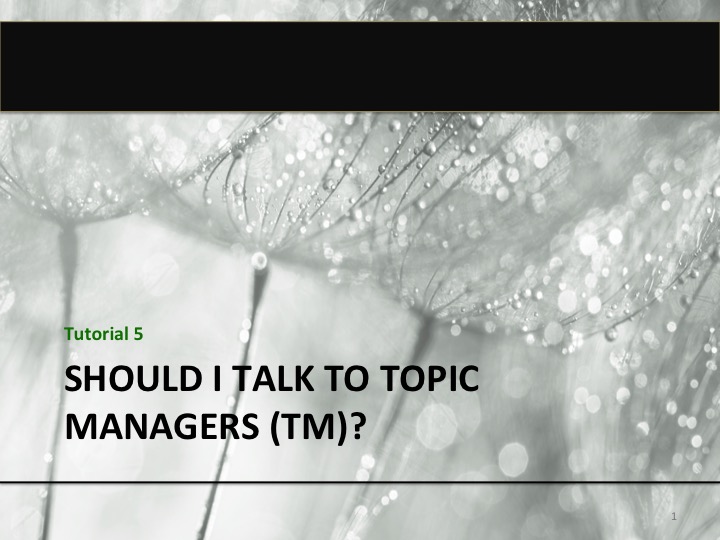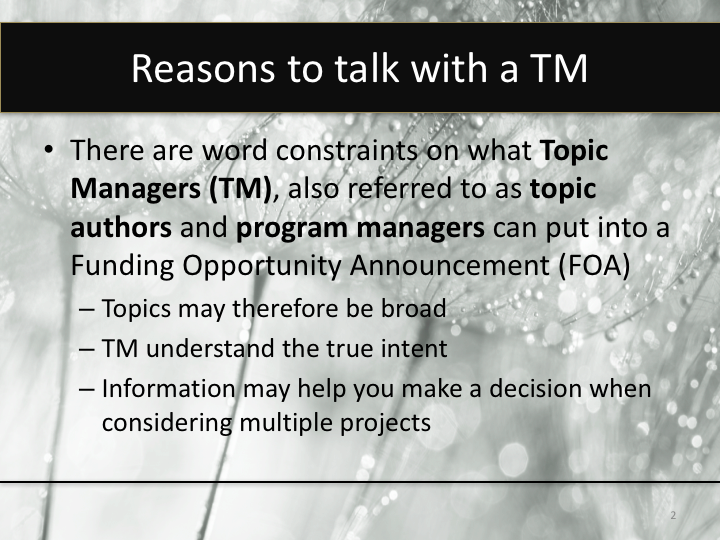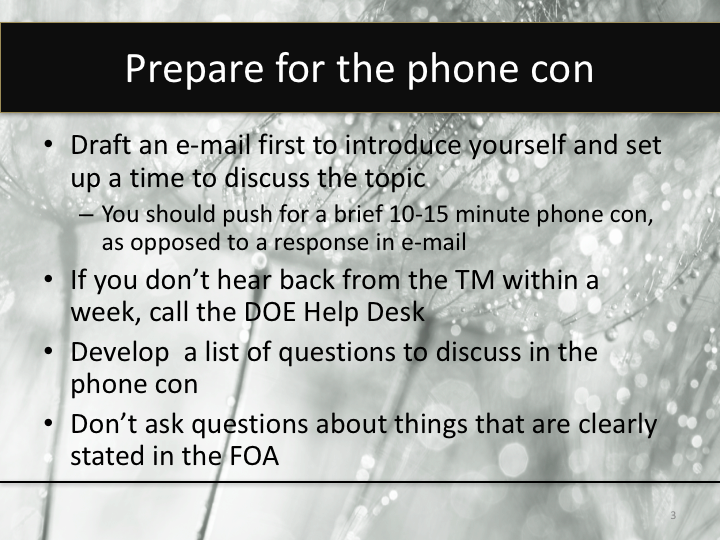Tutorial 5:
Should I talk to Topic Managers (TM)?
Small companies that are successful in winning SBIR and STTR awards tend to have open lines of communication between themselves and representatives of the awarding agencies. One agency representative with whom communication is important is the Topic Manager (TM). Within the Department of Energy different titles are used for this person including topic author or program manager. Basically you can think of the TM as the individual who in all likelihood has written the topic and with whom you, the small business applicant can have a conversation if you have questions regarding the topic itself.
The primary reason to speak with the Topic Manager is to glean additional insights regarding the topic. Agencies are often constrained in how much detail they can put into the solicitation/funding opportunity announcement (FOA). Therefore some topics are broad and may leave lingering questions in the potential applicants mind. Another reason that a topic may be broad is because the Agency wants a diversity of responses – so a conversation will be very helpful in gaining the needed clarity.
Another reason to have a conversation is to help you make a decision which topic to respond to when it appears that there are multiple topics that seem appropriate. The TM often understands the true intent or priorities of one topic versus another and may be able to share that information with you, as well as offer some advice on common mistakes that applicants make.
Communication is a two way street. This initial call also provides you with the opportunity to introduce yourself and your company to the Topic Manager. Decisions about you and your proposal will not be made during this conversation, but a favorable interaction can help “break the ice” that otherwise might exist between you as a newcomer (to SBIR/STTR and/or this agency) and the TM.
Many newcomers to the SBIR/STTR processes are reluctant to call a topic manager, as they are uncertain what they can and cannot ask. This is one of the reasons that DOE began to host webinars on all of their topics. It is recommended that you attend the webinars and ask questions or listen to recordings of the webinars at any time. Recordings of the webinars can be found on the DOE FOA site. If, after listening to the webinars, ou have any lingering questions, it is recommended that you call the topic manager.
In DOE’s topics, the agency has been fairly specific about what it is looking for, so your questions should be focused on gaining a better understanding of the agency’s need and the “fit” between their needs and your thoughts regarding a solution. Your goal for the phone conversation is to end the call with a clear understanding of what the agency wants and equally important, what the TM doesn’t want and/or is not interested in. In this way you can assess whether your innovation will satisfy DOE’s need. The TM can be helpful in providing insights and information that will allow you to make the determination of whether or not you can deliver what the agency truly wants. Paraphrasing one specific-topic agency representative, “give us what we asked for, not what you think we need.”
You are encouraged to set up a conversation with the Topic Manager via an introductory email. Indicate you are interested in submitting a proposal on the topic for which the TM is responsible, but that you have some questions. Ask if they would be willing to speak with you for a brief period of time, preferably by phone, at their convenience in the next few days. Be specific about that “brief” time period—we suggest asking them for 10 or 15 minutes, as this indicates you respect their time and recognize they have other responsibilities. It is preferable to ask your questions via the phone, as it often leads to a richer dialog and makes it easier to ask clarifying questions (you also may benefit from the way in which your questions are answered) – but realize the TM may require or prefer to correspond via email.
Develop your list of questions in advance of the TM conversation so you won’t leave out anything of importance. Try to keep your questions brief and to the point, so more of those precious 10-15 minutes are left for the TM to provide answers. You learn when the TM speaks, not when you do. You may want to briefly explain what you are planning to propose and seek the TM’s concurrence that it fits the topic. However, refrain from doing this until you’ve asked enough questions to know whether your innovation is generally consistent with what they are looking for or not.
Be sure you don’t ask questions that are readily answered by the agency’s solicitation/FOA, or information on its website. To do so tells the Topic Manager that you haven’t done your homework, and the TM can be disappointed that you are taking his/her time with such questions. So be sure to review this background information thoroughly before you have your conversation with the TM. Even if your communication with the TM covers only 10-15 minutes, you will be surprised how much you can learn during this brief time. Again, how much you learn will depend on being disciplined to ask brief questions and then pause to allow the TM to respond.
Some agencies have limitations on when you can speak with TAs about SBIR/STTR topics (in fact, some agencies don’t allow TM conversations once the solicitation is released and proposals are being invited). The DOE allows these conversations to occur anytime. You should have the TM conversation as soon as possible after the topics have been announced, for two important reasons.
- First, you want to know as soon as possible whether a particular topic represents an opportunity for you, so you have as much time as possible to prepare the proposal.
- Second, DOE requires that you submit a Letter of Intent (LOI) approximately 6 weeks before your full Phase I SBIR/STTR proposal is due and 3 weeks after the Funding Opportunity Announcement (FOA) is released. That LOI should clearly indicate the relevance of your proposal to a specific DOE topic/subtopic.
Finally, realize the TM is only one of the Federal government parties with whom you may want to correspond during your Phase I SBIR/STTR proposal submission process. With the DOE, for example, you may want to contact the Grants.gov Help Desk, the SBIR/STTR Help Desk, or the DOE SBIR program office.
Sometimes a TM may not be available for a conversation. In this case it is highly recommended that you listen to the webinars that have been recorded by the topic managers in which they highlight their interest areas and that you carefully read all documents referenced in the relevant topic description. The topic webinars are available from links on the DOE FOA page and are listed right under the topics document.
Quiz: Tutorial 5 : Should I talk to Topic Managers (TM)?
1
You can only talk to the DOE TM before the due date for the Letter of Intent.
Nice Work
Try Again
2
Which of the following statements is NOT accurate?
Nice Work
Try Again
3
Which of the following are benefits of speaking with the TM?
Nice Work
Try Again
4
What the TM says mirrors exactly what every reviewer and decision maker at the agency thinks.
Nice Work
Try Again


